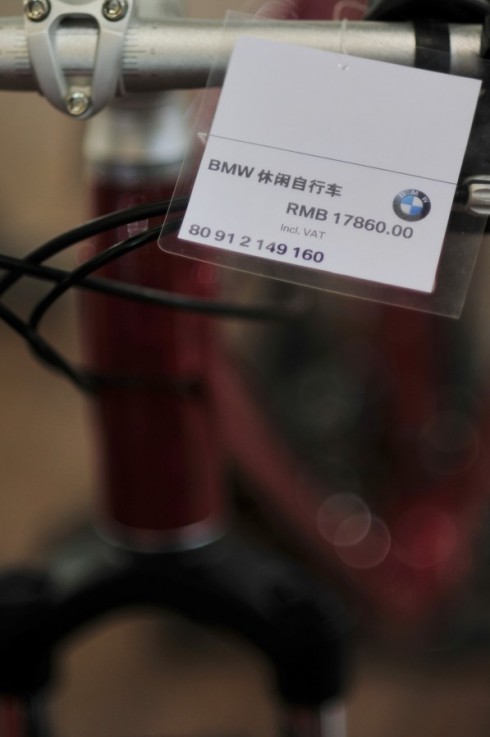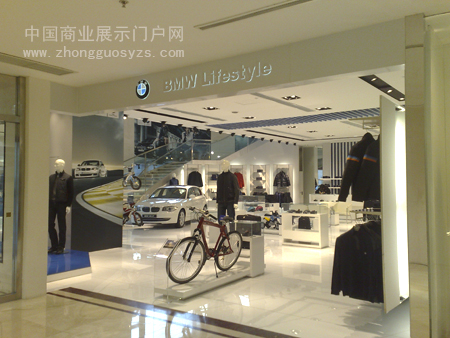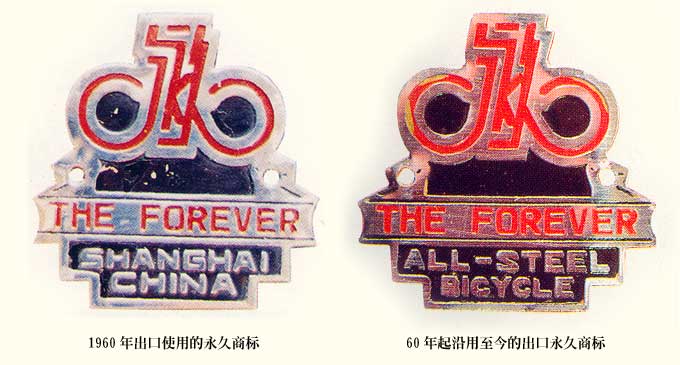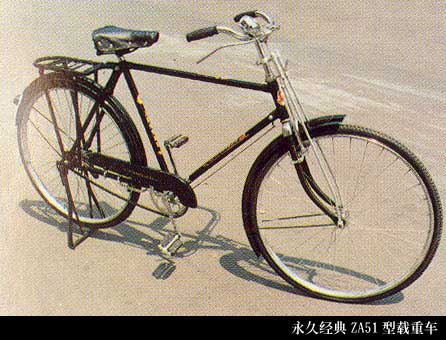Peking University, Oct. 13, 2011:

A BMW bicycle priced 17,860 Yuan
http://zhuanti.soulv.com/news/zuche/201002/1736.html
“Lord… It costs 22,000 Yuan!” said a lady customer, looking at a bicycle displayed in Wang Fujing Street’s Oriental Plaza – Beijing’s golden center for most luxury brands. Among them are Chanel, Rolex, Estée Lauder and Mercedes, but hardly anyone would expect that a bicycle could be allowed to stand with these nobles.
It belongs to a store called “BMW Lifestyle” in which there is a miscellaneous assortment of goods: BMW watches, BMW clothes, BMW key chains…all will cost you to bear the BMW name. But the most favored one is the bicycle – the commodity exhibited at the entrance of the store, with a dangling price tag that not only catches eyes, but also shocks them.
Besides BMW, Audi, in April 2011, launched a new set of products: Duo City (42,700 RMB), Duo Sport (48,100 RMB) and Duo Road (48,800 RMB) – all bicycles, not vehicles, ranging from touring, cruiser to sport bikes. Ferrari and Chanel, in previous years, have released similar products, whose rocket-soaring prices even exceed their traditional luxuries as racing cars and perfumes.
These foreign luxuries are entering China – the biggest bicycle producer and consumer in the world. Here bikes were once considered a household luxury back in the 1960s, but it has now become a common item since the reform and opening up policy in 1979. Will those high-class, exorbitant bikes grasp Chinese customer’s heart like their counterparts half a century ago?
Sun Xiaomei, a saleswoman at BMW Lifestyle told the journalist that BMW bikes are getting popular among Chinese customers, especially the rising upper-middle class. “We ARE selling luxuries,” said Sun, “and a lot of customers show great interest in our bikes. Yesterday we sold a single one at 70,000 RMB. This morning a woman wanted to buy a city bike for her daughter, but unfortunately we don’t have women’s style.”
According to Sun, there are 47 BMW stores around China, covering almost all the nation’s metropolises like Beijing, Shanghai, and Urumqi. About fifty bicycles are sold per month, with an increasing number of demands. “Chinese people are becoming rich, that’s why more and more customers start to consider luxuries, including luxury bicycles. The market will be thriving.” Sun said.

A BMW Lifestyle store at Beijing Junefield Department Stores
http://www.zhongguosyzs.com/news/7685055.html
Li Tao, a bicycle amateur, has a different view. He said that fifty was too small a number for sale. “Though people are getting wealthy, the market is only confined to those who wish to and are able to show off because a 15,500 RMB bicycle could only worth 4,000-5,000 in real cost, and many people know this clearly. I could tell you the materials of the bike, believe me, the price is absolutely owing to the brand effect.”
Maybe, or maybe not. “Fifty is not a large number, but we should nevertheless remember that we are selling luxuries. We cannot expect for the entire market.” Sun Xiaomei said, and she attributed a limited sale to a limitation of knowledge. “Few people know that BMW produces bicycles,” said Sun, “but once they know the fact, a lot of them will stop to take a look.”
On the brand effect, she by no means agreed. “The products are actually not glorified by brand. They contain high technology and that’s why they are expensive.” She showed the journalist a BMW bike: the frame is made of aluminum alloy which is formed by a very advanced technology – hydraulic pressure; the outer shell is colored by dusting technology and the chain, the gear, the hub, the spokes, all of them comes from Shimano Alivio. Besides, the bike is lightweight and strong. The flowering description resembles the glittering bicycles, making it hardly doubtful that the product deserves the price. “As a Chinese proverb goes, ‘you get what you pay.’ ”Sun added.
While speaking to the journalist, Sun saw a couple stop at the entrance of the store. They kept looking at the cheapest city bike, costing about 15,500 RMB. Sun greeted them with a gentle smile.
“How do you think of this bicycle?” asked Sun.
“Well, it’s very nice. I’ll consider it,” said the husband. “But it would be much better if you could lower the price a bit, say 12,000 Yuan, though I am able to afford the present one.”
The couple might be typical of the newly affluent with more disposable incomes with which to spend on luxury goods. But for most people, an over-ten-thousand-Yuan bicycle still sounds weird and extravagant.
Chen Yi, president of the Bicycle Association of Peking University, said that he would never buy any such bikes. “I will not blow my cash in this way,” said he, “Bicycle for me is merely a means of transportation.”
Chen’s view may be shared by a large number of Chinese ordinary people. Many of them purchase bicycles out of necessity rather than luxury – they ride bicycles to school, to work, and for short distance trips. Even in the 1960s when China’s bicycle industry started with few brands, such as Flying Pigeon, Forever and Phoenix, bicycles were valued for its convenience besides its rarity and expenditure.
“I dreamt of having a bicycle because I was tired of walking to everywhere,” said Xi Min, a 53-year woman who got her first bike as a birthday gift at the age of 20, “But it was difficult to get one back then; a bicycle cost around 180 Yuan while my father’s monthly salary was only 30 Yuan, so he needed to keep saving money for a whole year to earn me a single ‘Forever’.”
Xi lived in a courtyard where the shining new bike was soon discovered by other families. “My neighbor envied me for this, because it showed the ability to pay.”

A brand image of Forever, a renowned bicycle producer in China
http://www.cnforever.com/cn/displayHistory.asp

A bike by Yongjiu (Forever) Company
http://www.cnforever.com/cn/displayHistory.asp
However, like many other middle-aged persons, to Xi the bicycle was not only the symbol of affluence, it was also an important part of her life. She still remembered the excitement when she learned how to ride her bike, the happy times she spent with her family and friends, riding bicycles to the suburbs, enjoying the lovely scenery. “I love my ‘Forever’ so much that wherever I went, I always rode it,” Xi said.
Nowadays bicycles have been attainable for most people, with a sufficient supply in market. But as China enhances its urbanization process, bicycles are less able to meet people’s travel demands in big cities. A lot of middle class individuals or families prefer automobiles over bicycles. Luxury bikes, to those people, are not of practical uses, but rather a reflection on wealth. “They can still signify wealth and power,” said Chen Yi, “though bicycles in general no longer cost too much, people’s vanity never dies.”
What’s more, as the store name “BMW Lifestyle” suggests, luxury bikes signify a chosen lifestyle – an exclusive and personalized one, and create a sense of “uniqueness.” Those bikes might also serve as an expression of individuality, that’s why BMW design various types of bikes and also a series of commodities, targeting at different customers’ personal needs. “In my view, if BMW cooperates with traditional bicycle manufacturers and expands their products to various types of levels, the market is possibly promising” Chen said.
However, Li Tao will not be a member of such a market. Whenever he is shown a BMW bicycle, he is amused. “I will say cool,” he said, “But luxuries are only for bumpkins. Only those who don’t quite understand bicycles will be exhilarated by BMW.”
Reported by: Shen Xi, Shan Minjie, Chen Miaojuan and Nueraili
Edited by: Chen Miaojuan